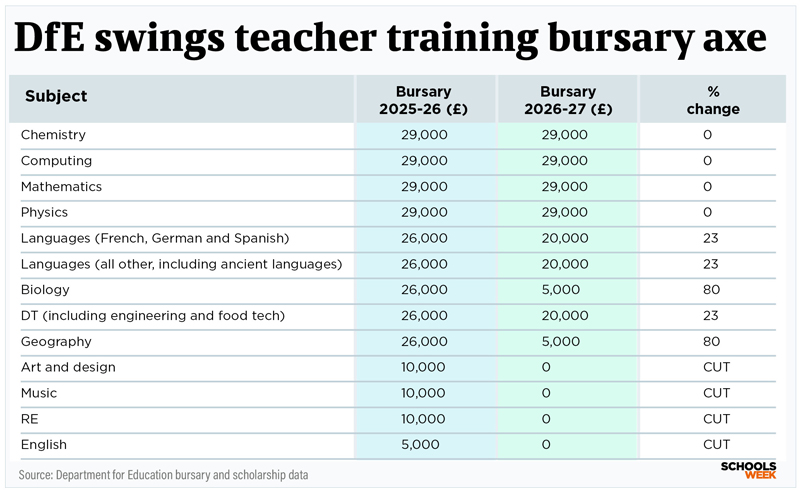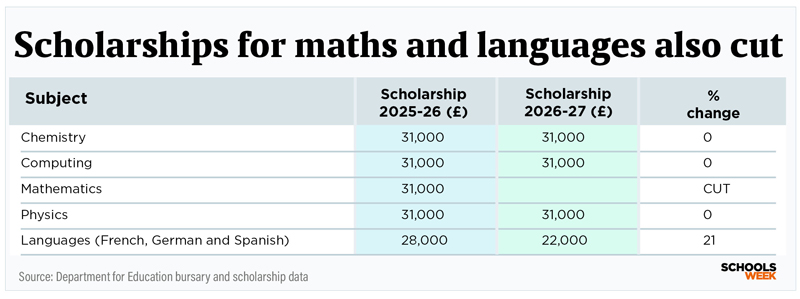The government has swung the axe on teacher training incentives – including cutting funding for shortage subjects such as maths and foreign languages.
Of the 13 subjects with bursaries available for trainees this year, four have been axed completely while another five have had funding cut.
Meanwhile, a £31,000 scholarship for top graduates to train in maths has been ditched altogether.
It comes despite the government’s election pledge of boosting teacher numbers by 6,500 – and while recruitment has picked up this year, forecasts suggest the secondary recruitment target will still be missed.
Fresh analysis by the National Foundation for Educational Research (NFER) estimates the new cuts could lead to a significant drop in trainees next year.
“We estimate that these cuts, on their own, could lead to around 2,400 fewer trainees next year, which seems counterproductive for the Government’s 6,500 teacher target,” said NFER workforce lead Jack Worth.
English, music and RE bursaries axed
Bursaries for those training to teach next year in English, music, art and design, and religious education have all been axed.

For teachers training this academic year, each subject came with bursaries worth £10,000 except English, which carried as £5,000 bursary.
English is one of just five subjects that over-recruited in 2024-25 – the latest year for which data is available.
It hit 101 per cent of its postgraduate initial teacher training (ITT) target, after missing its target by 28 per cent the previous year.
Meanwhile bursaries of £26,000 that were available for postgraduates training to teach biology and geography this academic year are being cut to just £5,000 for 2026-27.
Biology also over-recruited in 2024-25, achieving 119 per cent of its target after struggling to recruit the previous year. Geography achieved 92 per cent of its target.
Bursaries for those training to teach languages or design technology are also being cut, from £26,000 to £20,000.
Recruitment for modern foreign languages was just 43 per cent of its recruitment target in 2024-25.
Chemistry, computing, maths and physics bursaries will remain at £29,000.
Maths scholarship cut
This academic year, £31,000 scholarships were also available for graduates with a 2:2 or above, training in shortage subjects maths, chemistry, computing or physics.
But DfE has now axed the maths scholarship.

Maths saw a 24 per cent increase in trainees in 2024-25, compared to the previous year, but still under-recruited, hitting just 73 per cent of its target.
The DfE said it intended to offer a maths scholarship for next year, but the Institute of Mathematics and its Applications (IMA) “made the difficult decision to not extend their grant agreement” with government to fund the scheme.
IMA’s executive director Rosalind Azouzi said: “As a small charitable organisation, we must continually assess our capacity to sustain future commitments.
“Due to the financial challenges of delivering our other wide-reaching commitments in education, the IMA is not able to commit to participation in the scheme for 2026/7.” IMA is “fully committed to supporting the cohorts already enrolled in the programme through 2025-26”.
Chemistry, computing and physics scholarships will remain at £31,000. In 2024-25, physics hit just 31 per cent of its target, while chemistry reached 62 per cent and computing 37 per cent.
However £28,000 scholarships previously available for those training to teach French, German and Spanish are being cut to £22,000.
Initial teacher training (ITT) recruitment data for the 2024-25 academic year show the government hit just 62 per cent of its postgraduate ITT (PGITT) recruitment target for secondary subjects.
But this marked an improvement on the previous year, when just 48 per cent of the PGITT target was reached.
The target has not been met since 2012-13, except in 2020-21 which saw a spike in interest amid the pandemic.
Data showing how recruitment has fared for the 2025-26 academic year is due to be published in December.
But forecasts earlier this year suggested secondary recruitment is expected to be around 85 per cent of its target – the highest since the 2020-21 Covid recruitment boom. Subjects such as maths, chemistry and biology are all expected to over-recruit.
While recruitment has risen, the DfE has also cut its targets for the 2026 academic year by almost 20 per cent, amid “more favourable forecasts” for teacher retention.
‘Time to think in moral terms’
The DfE said the amount of money it provides for teacher training incentives “correlates with our teacher recruitment and retention pipeline. As there were an additional 2,300 in schools this year compared to last year, the incentives package reflects that.”
But Emma Hollis, CEO of the National Association of School-based Teacher Trainers (NASBTT) said: “It is time for government to stop thinking purely in economic, transactional terms and start thinking in moral and ethical ones.

“We need a stronger message about the importance of teaching and its impact on the development of young people, as well as on society and growth.”
She renewed NASBTT’s call that “no trainee, no matter what subject they teach, should be expected to take on additional debt to train to teach in our state schools”.
The DfE as also confirmed changes to grants available to ITT providers to help cover salaries for postgraduate teaching apprentices.
Grants of £29,000 are still available for chemistry, computing, maths and physics. But biology and geography grants have been cut from £17,000 and £5,000.
Cuts have also been made to grants for teaching apprenticeships for other subjects, such as languages.
Education secretary Bridget Phillipson said government “is determined that we have more brilliant teachers, in more schools, improving the life chances of more children and young people”.
Phillipson said government has “already begun to move the dial, with more teachers in our schools this year than last, and big increases in people accepting teaching training places in subjects including chemistry, physics, and maths.”
“But there is more to do, and we need talented people with the passion and drive to inspire the next generation – working their magic, making school a place pupils want to be, boosting outcomes and transforming the lives of our young people.”
















Worth noting: physics teachers have been as rare as hens teeth since the 1960’s, STEAM was put into reverse gear in the late 1970’s, integrated STEaMplus learning and creatively progressively crushed out of the classroom and teacher training. Results: an education system parked in the Victorian era, a massive skills shortfall in the workforce and the absolute necessity to recruit millions of workers and professionals from abroad.